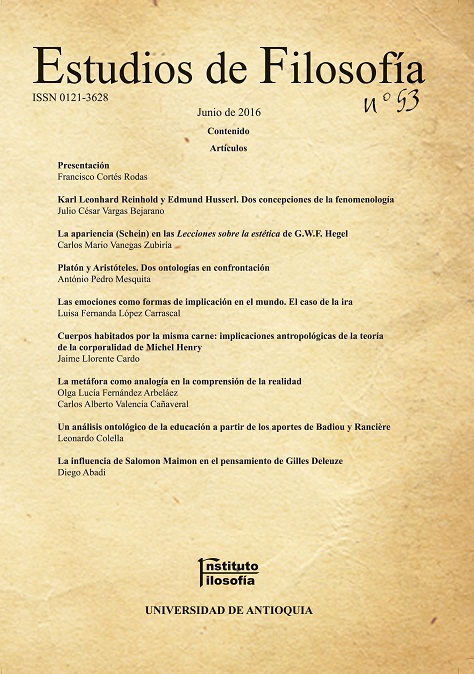La influencia de Salomon Maimon en el pensamiento de Gilles Deleuze
DOI:
https://doi.org/10.17533/udea.ef.n53a09Palabras clave:
Maimon, Deleuze, Kant, idea, diferencialesResumen
En el presente texto nos proponemos brindar una lectura de la obra de Salomon Maimon que permita echar luz sobre algunas de las problemáticas que el pensamiento deleuziano aborda en la etapa de producción filosófica que se completa con Diferencia y repetición. Para ello haremos en un primer momento una exposición general del pensamiento maimoniano, trazando comparaciones con el pensamiento kantiano e intentando dar cuenta de sus puntos de contacto y de sus eventuales divergencias. En un segundo momento aprovecharemos lo expuesto anteriormente para hacer un doble movimiento: intentaremos por una parte problematizar algunos de los conceptos de Maimon, mientras que por otra procuraremos mostrar en qué sentido esas tensiones abren a cuestiones específicamente deleuzianas. Por último, exhibiremos algunos caracteres de la Idea deleuziana y de los conceptos relacionados con ella, destacando los condicionamientos de los cuáles parte y las novedosas resoluciones que propone.
Descargas
Citas
Deleuze, G. (1973) Nietzsche y la filosofía, Trad. de Carmen Artal, Barcelona, Anagrama.
Deleuze, G. (1987) El bergsonismo, Trad. de Luis Ferrero Carracedo, Cátedra, Madrid.
Deleuze, G. (2002) Diferencia y repetición, Trad. de María Silvia Delpy y Hugo Beccacece, Amorrortu, Buenos Aires.
Freudhental, G. (2003) Salomon Maimon: Rational Dogmatist, Empirical Skeptic. Critical Assessments, Kluwer Academic Publishers, Dordrecht.
Gueroult, M. (1929) La philosophie transcendentale de Salomon Maïmon, Alcan, Paris.
Hughes, J. (2009) Deleuze’s Difference and repetition. A readers guide, Continuum, Londres.
Jones, G. (2009) Solomon Maimon. En: Jones, G y Roffe, J. (eds.). Deleuze’s philosophical linneage, Edinburgh University Press, Edinburgh.
Kant, I. (2007) Crítica de la razón pura, Trad. de Mario Caimi, Colihue, Buenos Aires.
Maimon, S. (2010) Essay on transcendental philosophy, Trad. de Nick Midgley, Henry Somers-Hall, Alistair Welchman y Merten Reg, Continuum, Londres.
Voss, D. (2011) Maimon and Deleuze: the viewpoint of internal genesis and the concept of differentials, Parrhesia, vol 11, 62-74.
Publicado
Cómo citar
Licencia
Derechos de autor 2016 Diego Abadi

Esta obra está bajo una licencia internacional Creative Commons Atribución-NoComercial-CompartirIgual 4.0.
Los autores que publican en Estudios de Filosofía acuerdan los siguientes términos:
1. El Autor retiene el copyright del "Artículo", por el cual se entiende todos los objetos digitales que pueden resultar de la subsiguiente publicación o distribución electrónica.
2. En conformidad con los términos de este acuerdo, el autor garantizará a Estudios de Filosofía como Editor el derecho de la primera publicación del artículo.
3. El Autor le concederá al Editor un derecho perpetuo y no-exclusivo, así como una licencia de la misma clase, de publicar, archivar y hacer accesible el Artículo parcial o totalmente en todos los medios conocidos o por conocerse, derecho y licencia que se conocen como Creative Commons License Deed. Atribución-No Comercial- Compartir igual CC BY-NC-SA o su equivalente que para efectos de eliminar toda duda, le permite a otros copiar, distribuir, y transmitir el Artículo bajo las siguientes condiciones: (a) Atribución: Se deben reconocer los créditos de la obra de la manera especificada por el Autor a Estudios de Filosofía, pero no de una manera que sugiera que tiene su apoyo o que apoyan el uso que hace de su obra. (b) No Comercial: No se puede utilizar el Artículo para fines comerciales.
4. El Autor puede realizar otros acuerdos contractuales no comerciales para la distribución no exclusiva de la versión publicada del Artículo (v. gr. ponerlo en un repositorio institucional o publicarlo en un libro) con la condición de que haga el debido reconocimiento de su publicación original en Estudios de Filosofía.
5. A los Autores se les permite y Estudios de Filosofía promueve publicar en línea (online) la versión pre-impresa del Artículo en repositorios institucionales o en sus páginas web, antes y durante la publicación, por cuanto que puede producir intercambios académicos productivos, así como una mayor citación del Artículo publicado (ver The Effect of Open Access). Dicha publicación durante el proceso de producción y en la publicación del Artículo se espera que se actualice al momento de salir la versión final, incluyendo una referencia a la URL de Estudios de Filosofía.















